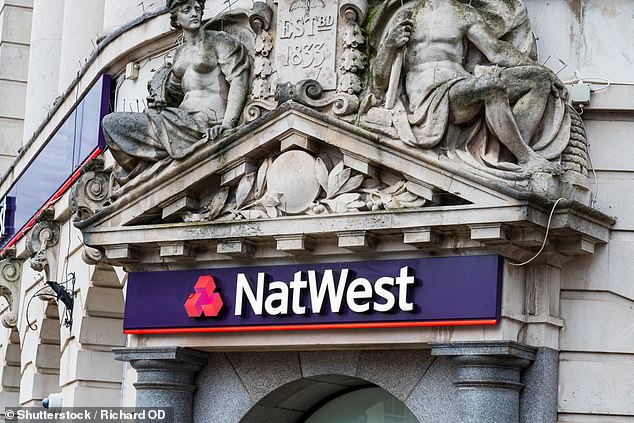Table of Contents
Mortgage rates below 4 percent are beginning to disappear and lenders are pricing up mortgage loans.
NatWest is the latest bank to announce it will increase mortgage rates, raising selected fixed rates by up to 0.3 percentage points.
It follows in the wake of Santander and TSB, which announced similar changes on Monday.
From Thursday, NatWest will increase its five-year low from 3.79 per cent to 4.09 per cent.
Rate rise: NatWest is the latest mortgage lender to change its tune and increase rates after months of cuts
The deal, which was available to home buyers with a deposit of 40 per cent or more, means that on a £200,000 mortgage repaid over 25 years, the monthly payment will now be £1,066 a month, up from £1,033 .
Those buying with a 25 per cent deposit will also not be able to access rates below 4 per cent through NatWest.
NatWest is increasing the interest rate on this product from 3.89 per cent to 4.19 per cent.
Until last week, mortgage rates had been on a downward trajectory. Between early July and the end of last week, the cheapest five-year fixed-rate mortgage available fell from 4.28 percent to 3.68 percent.
Meanwhile, the two-year lowest fixing fell from 4.68 percent to 3.84 percent during that time.
They are now slowly creeping back up with the lowest five-year rate at 3.79 percent and the lowest two-year rate at 3.9 percent.
More lenders are expected to follow suit and raise rates in the coming weeks.
Rates below 4 per cent may temporarily disappear, according to Ravesh Patel, director and senior mortgage consultant at brokerage Reside Mortgages.
“In the short term, rates below 4 percent will likely disappear soon considering rising swap rates, which is a good indicator of the price direction of fixed rates,” Patel said.
‘As things stand, there are only a handful of lenders who have rates below 4 per cent over a two-year term at 60 per cent of the loan value. If swap rates continue to rise, lenders are likely to raise prices accordingly.’
Why are rates rising?
Mortgage lenders consider several factors when setting their fixed mortgage rates, from borrower demand to general economic sentiment to their own margins.
Swap rates are the easiest way to interpret where fixed rates are headed.
Sonia swap rates are an interbank lending rate that essentially shows what lenders believe the future holds with respect to interest rates.
When Sonia swaps rise high enough, it often results in fixed mortgage rates rising, and vice versa when they fall.

Expert: Ravesh Patel, Director and Senior Mortgage Consultant at Reside Mortgages
In recent weeks Sonia’s swaps have risen again. As of Oct. 11, two-year swaps were at 4.01 percent and five-year swaps were at 3.79 percent.
That marks an increase from a month ago, when two-year swaps were at 3.73 percent and five-year swaps were at 3.38 percent.
“There are quite a few things that are affecting swap rates at the moment, which is affecting market sentiment,” adds Ravesh Patel.
‘That is, the upcoming budget focused on potential tax increases, volatility in energy markets – which was again a major driver of inflation after 2022 – and continued geopolitical instability in the Middle East, especially its potential impact on oil prices.
‘Current inflation is 1.7 percent, which is good news; however, service level inflation is 4.9 percent.
‘The long-term outlook is very optimistic; Once inflation stabilizes, swap rates will likely stabilize and perhaps fall, but at a level higher than pre-pandemic lows, to new “normal” levels in the 3 percent range.
“International trends, from rate cuts by the Federal Reserve and European Central Bank to rate-hiking stances, will indirectly affect UK interest rate decisions.”
Could falling inflation save the day for borrowers?
The Bank of England is widely expected to cut interest rates next month after inflation fell below its 2 percent target for the first time in more than three years.
The latest reading from the ONS showed inflation fell to 1.7 per cent in the 12 months to September, down from 2.2 per cent in August.
This represents the first time since April 2021 that inflation has fallen below target and was below what markets had forecast of 1.9 per cent.
Some experts believe this increases the chances that the Bank of England will accelerate the pace of interest rate cuts.
Of course, this would cause mortgage lenders to expect mortgage rates to follow suit.
However, Peter Stimson, head of product at MPowered Mortgages, believes there is unlikely to be any change in the direction of mortgage rates even if the Bank reduces the base rate next month.

Peter Stimson, Head of Product Development Team at MPowered Mortgages
“It’s tempting to view such a big drop in inflation as the start of an open season on cheaper mortgages,” Stimson said.
‘Since the Governor of the Bank of England said earlier this month that he was prepared to cut the base rate ‘more aggressively’, inflationary pressure has eased significantly and given the Bank more freedom to cut further and more quickly.
“With annual wage inflation falling below 5 percent for the first time in more than two years and consumer inflation now comfortably below the Bank’s target of 2 percent, the stars appear well aligned for the Policy Committee The Bank’s Monetary Committee will make another Base Rate cut at its next meeting in three weeks.
And he added: ‘There is only one drawback to this optimistic outlook. The swaps market, which ultimately determines how lenders price their mortgages, has been rising over the past fortnight.
‘So much so that one lender is currently offering a mortgage rate lower than the equivalent swap rate.
‘Translation: it is selling money for less than the wholesale price. Such crazy pricing is clearly unsustainable, but it also reveals the intense competition among lenders for borrowers’ business.
‘Swap rates are determined by a wider range of factors than the base rate, including bond yields, which have risen sharply amid investor uncertainty over the upcoming budget.
“So, while a base rate cut in November now looks clearly possible, if not likely, there is no guarantee that it will instantly translate into much cheaper mortgages.”
Some links in this article may be affiliate links. If you click on them, we may earn a small commission. That helps us fund This Is Money and keep it free to use. We do not write articles to promote products. We do not allow any commercial relationship to affect our editorial independence.

